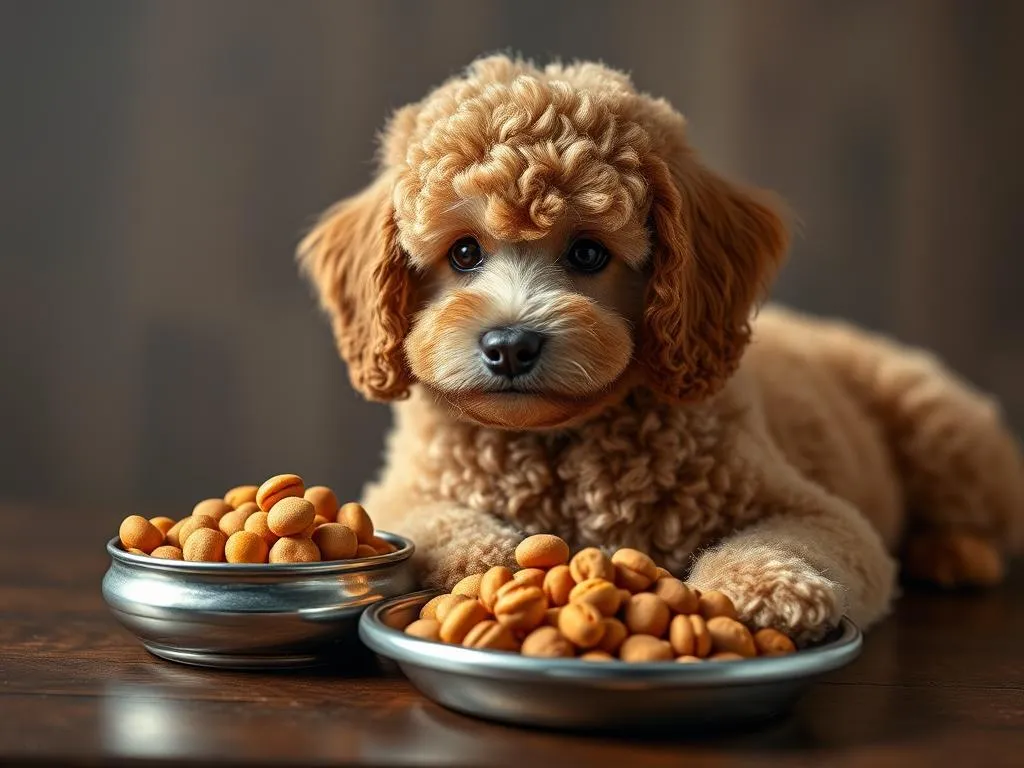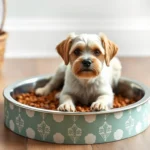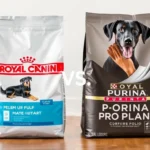
Introduction
Toy Poodles are one of the most beloved small dog breeds, known for their intelligence, playful demeanor, and elegant appearance. Weighing between 4 to 6 pounds and standing about 10 inches tall, these pint-sized companions are incredibly versatile, excelling both as family pets and service dogs. However, their small size requires a specific approach to nutrition that is tailored to their unique needs. Understanding what constitutes the best dog food for Toy Poodles is crucial for maintaining their health and well-being.
Nutrition plays a vital role in the overall quality of life for Toy Poodles. A well-balanced diet ensures that they receive the essential nutrients needed for growth, energy, and disease prevention. This article aims to provide comprehensive guidance on selecting the best dog food for Toy Poodles, emphasizing the importance of tailored nutrition for this particular breed.
Understanding Toy Poodle Nutritional Needs
Unique Nutritional Requirements
Toy Poodles have distinct nutritional needs due to their size and metabolism. Their small stature means they have a faster metabolism than larger breeds, requiring a diet rich in high-quality protein and healthy fats to support their energy levels and muscle maintenance. A well-rounded diet for a Toy Poodle typically includes a mix of protein, fats, and carbohydrates to fuel their playful nature.
Protein is especially critical for Toy Poodles. High-quality animal-based proteins are essential for muscle development and overall health. Additionally, healthy fats help maintain a shiny coat and support skin health. Carbohydrates, particularly those that are easily digestible, provide quick energy and aid in digestive health.
Life Stages and Dietary Adjustments
Dietary needs change as Toy Poodles progress through different life stages. Here’s a quick overview:
-
Puppies: Toy Poodle puppies require a diet that is high in calories and nutrients to support their rapid growth and development. They typically need around 55-70 calories per pound of body weight.
-
Adults: Adult Toy Poodles generally require about 40-50 calories per pound of body weight. Their diet should focus on maintaining a healthy weight and providing adequate energy for their activity levels.
-
Seniors: Senior Toy Poodles may require fewer calories due to decreased activity levels. They typically need around 30-40 calories per pound of body weight. Diets for seniors should also include joint-supporting nutrients to help combat age-related issues.
Common Health Issues
Toy Poodles are prone to several health issues, including dental problems, obesity, and certain genetic conditions like hip dysplasia and eye disorders. Proper nutrition can play a significant role in mitigating these risks. For example, high-quality dog food can help maintain dental health and prevent obesity by providing balanced nutrition without unnecessary fillers. Additionally, including joint-supporting nutrients like glucosamine can help maintain mobility as they age.
Key Ingredients to Look For
High-Quality Protein Sources
When searching for the best dog food for Toy Poodles, it’s essential to prioritize high-quality protein sources. Look for foods that list animal meat as the first ingredient, as this indicates a higher protein content. Recommended protein sources include:
- Chicken: A common protein source that is easily digestible and rich in essential amino acids.
- Fish: Provides omega-3 fatty acids, which are beneficial for skin and coat health.
- Lamb: A good alternative for dogs that may have sensitivities to more common protein sources.
Healthy Fats
Healthy fats are crucial for Toy Poodles, contributing to skin and coat health as well as overall energy levels. Look for dog food that includes:
- Fish Oil: Rich in omega-3 fatty acids, which promote a healthy coat and skin.
- Flaxseed: A plant-based source of omega-3 fatty acids that also provides fiber.
Carbohydrates and Fiber
Easily digestible carbohydrates are important for providing energy. Recommended sources include:
- Sweet Potatoes: A great source of vitamins and fiber.
- Brown Rice: A digestible carbohydrate that provides energy without causing gastrointestinal upset.
Including fiber in their diet is also important for digestive health. Ingredients like beet pulp and pumpkin can help regulate digestion.
Vitamins and Minerals
A well-balanced diet should include essential vitamins and minerals to support overall health. Look for dog food that contains:
- Vitamins A, C, and E: Important for immune function and skin health.
- Calcium and Phosphorus: Critical for maintaining strong bones and teeth.
Types of Dog Food
Dry Dog Food (Kibble)
Kibble is one of the most popular types of dog food due to its convenience and dental health benefits. The crunchiness of kibble can help reduce plaque and tartar buildup. When selecting kibble for your Toy Poodle, look for brands that offer specific formulations for small breeds. Some recommended kibble brands include:
- Royal Canin: Known for breed-specific formulas that cater to the unique needs of Toy Poodles.
- Hill’s Science Diet: Offers a range of options that focus on balanced nutrition and health.
- Wellness CORE: High in protein with added probiotics for digestive health.
Wet Dog Food
Wet dog food can provide additional hydration and is often more palatable for picky eaters. It’s also easier to chew, making it a great option for senior dogs or those with dental issues. Suggested wet food options for Toy Poodles include:
- Blue Buffalo Homestyle Recipe: Packed with protein and made with real meat.
- Purina Pro Plan Savor: Provides a balanced diet with added vitamins and minerals.
Homemade Dog Food
Cooking for your Toy Poodle can be a rewarding option, but it requires careful planning to ensure a balanced diet. Pros include knowing exactly what your dog is eating, while cons involve the time commitment and ensuring nutritional adequacy. If you choose to prepare homemade meals, consider the following guidelines:
- Include a protein source (e.g., chicken, beef, or fish).
- Add carbohydrates (e.g., brown rice or sweet potatoes).
- Incorporate vegetables (e.g., carrots or green beans).
- Consult with a veterinarian or a pet nutritionist to ensure balance.
Raw Diet
The raw feeding trend has gained popularity in recent years, focusing on feeding dogs raw meat, bones, fruits, and vegetables. While some owners report benefits, it’s essential to understand the potential risks, such as bacterial contamination and nutritional imbalances. If considering a raw diet for your Toy Poodle, consult your veterinarian to ensure it meets their nutritional needs.
Recommended Dog Food Brands
When selecting the best dog food for Toy Poodles, several brands stand out for their quality and nutritional value. Here’s a brief overview of top-rated options:
-
Royal Canin: Offers breed-specific formulas tailored to the unique requirements of Toy Poodles, ensuring they receive optimal nutrition.
-
Hill’s Science Diet: Renowned for its scientifically formulated dog foods, providing balanced nutrition with age-specific options.
-
Orijen: Known for its high protein and grain-free formulations, Orijen uses fresh, regional ingredients to create a holistic diet.
-
Wellness: Focuses on natural ingredients and offers several options for small breeds that cater to various dietary needs.
Comparison of Price and Quality
When choosing dog food, consider both price and quality. While premium brands may be more expensive, they often provide better nutritional value and fewer fillers. On the other hand, budget-friendly options can still be nutritious; however, it’s essential to read the ingredient labels carefully. Look for brands that offer a good balance of quality ingredients at a reasonable price, ensuring you provide the best nutrition for your Toy Poodle without breaking the bank.
Transitioning Dog Food
Importance of Gradual Transition
When introducing a new dog food to your Toy Poodle, a gradual transition is necessary to avoid digestive upset. Switching foods suddenly can lead to gastrointestinal issues, such as diarrhea or vomiting.
Step-by-Step Guide to Transitioning
To ensure a smooth transition, follow this timeline:
- Days 1-3: Mix 25% new food with 75% old food.
- Days 4-6: Increase the new food to 50%, reducing the old food to 50%.
- Days 7-10: Mix 75% new food with 25% old food.
- Day 11 onward: Serve 100% new food.
Watch for signs of digestive upset during the transition, such as changes in stool consistency or appetite. If issues arise, slow down the transition process.
Monitoring Your Toy Poodle’s Health
Signs of Good Nutrition
A healthy diet generally reflects in your Toy Poodle’s overall condition. Indicators of good nutrition include:
- Shiny Coat: A glossy coat is a sign of proper nutrition and hydration.
- Energy Levels: Healthy Toy Poodles are typically active and playful.
- Ideal Weight: Maintaining a healthy weight is crucial for preventing obesity-related issues.
Regular Vet Check-Ups
Routine veterinary visits are essential for monitoring your Toy Poodle’s health. Discuss dietary changes with your veterinarian to ensure they align with your dog’s specific needs and health conditions. Regular health check-ups can help identify potential issues early, allowing for timely intervention.
Conclusion
Choosing the best dog food for Toy Poodles is essential for their overall health and well-being. By understanding their unique nutritional needs, selecting high-quality ingredients, and considering their life stage, you can ensure your Toy Poodle thrives. Remember that each dog is unique, and personalized nutrition is vital. Consulting with a veterinarian can provide tailored advice, ensuring your furry friend receives the best care possible.
Implement the information shared in this article to help your Toy Poodle lead a vibrant and healthy life. Stay informed about the latest trends in dog nutrition to continue providing the best for your beloved companion.









